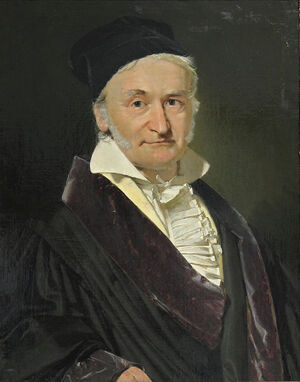Carl Friedrich Gauss (nonfiction)
Johann Carl Friedrich Gauss (/ɡaʊs/; German: Gauß, pronounced [ɡaʊs] Latin: Carolus Fridericus Gauss) (30 April 1777 Braunschweig – 23 February 1855 Göttingen) was a German mathematician who contributed significantly to many fields, including number theory, algebra, statistics, analysis, differential geometry, geodesy, geophysics, mechanics, electrostatics, astronomy, matrix theory, and optics.
Sometimes referred to as the Princeps mathematicorum (Latin, "the foremost of mathematicians") and "greatest mathematician since antiquity", Gauss had an exceptional influence in many fields of mathematics and science and is ranked as one of history's most influential mathematicians.
On October 16, 1797, Gauss recorded in his diary that he had discovered a new proof of the Pythagorean Theorem.
On September 2, 1808, Gauss wrote to mathematician Wolfgang Bolyai, saying: "It is not knowledge, but the act of learning, not possession but the act of getting there, which grants the greatest enjoyment."
On April 28, 1817 Gauss wrote to astronomer H. W. M. Oblers, saying, "I am becoming more and more convinced that the necessity of our (Euclidean) geometry cannot be proved, at least not by human intellect nor for the human intellect."
On January 30, 1830, Gauss wrote a letter to Pierre-Simon Laplace about a "curious problem" that he had been working on for twelve years. He gave the limiting value of the frequency of distribution of positive integers in the continued fraction of a random number (now called the Gauss-Kuzmin Distribution) as log2(1+x) . Gauss then asked if Laplace ccould offer help in finding the error term.
In the News
Fiction cross-reference
Nonfiction cross-reference
- Wolfgang Bolyai (nonfiction)
- Moritz Cantor (nonfiction) - Doctoral student
- Johann Christian Martin Bartels (nonfiction) - Academic advisor
- Richard Dedekind (nonfiction) - Doctoral student
- Peter Gustav Lejeune Dirichlet (nonfiction) - Notable student
- Gotthold Eisenstein (nonfiction) - Notable student
- Johann Encke (nonfiction) - Notable student
- Sophie Germain (nonfiction) - epistolary correspondent
- Christoph Gudermann (nonfiction) - Notable student
- Mathematician (nonfiction)
- Christian Ludwig Gerling (nonfiction) - Doctoral student
- Sophie Germain (nonfiction)
- Carl Wolfgang Benjamin Goldschmidt (nonfiction) - Notable student
- Gustav Kirchhoff (nonfiction) - Notable student
- Ernst Kummer (nonfiction) - Notable student
- Pierre-Simon Laplace (nonfiction)
- Johann Listing (nonfiction) - Doctoral student
- Ferdinand Minding (nonfiction) - Influenced
- August Ferdinand Möbius (nonfiction) - Notable student
- Heinrich Wilhelm Matthias Olbers (nonfiction)
- Christian Peters (nonfiction) - Doctoral student
- Johann Friedrich Pfaff (nonfiction) - Doctoral advisor
- Bernhard Riemann (nonfiction) - Doctoral student
- L.C. Schnürlein (nonfiction) - Notable student
- Statistics (nonfiction)
- Theorema Egregium (nonfiction)
- Julius Weisbach (nonfiction) - Notable student
External links:
- Carl Friedrich Gauss @ Wikipedia
